Royal Family: The Story Behind The University of Texas at Dallas' Powerhouse Chess Team
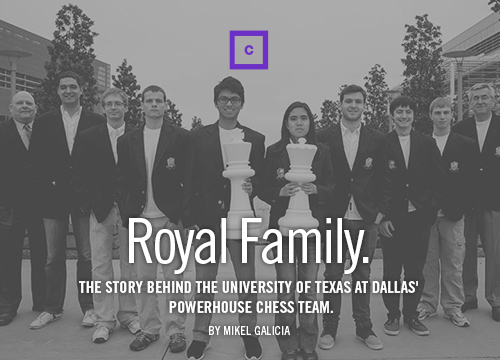
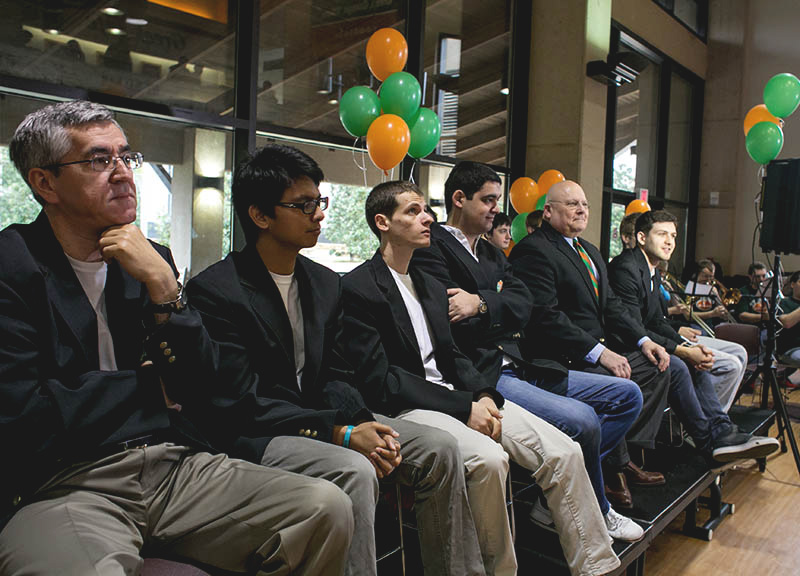

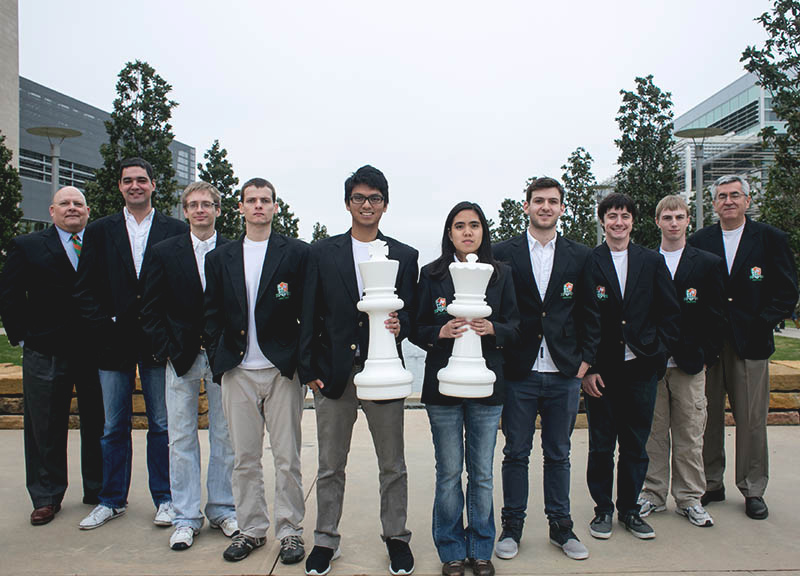
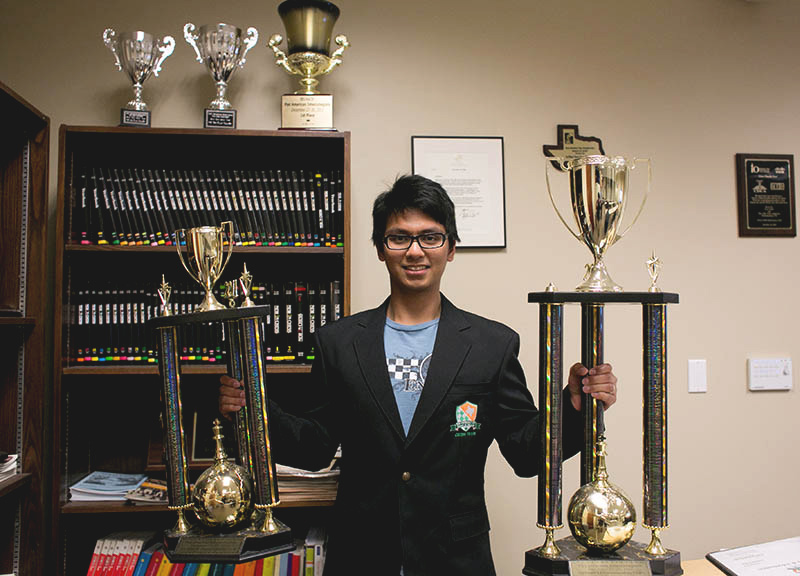
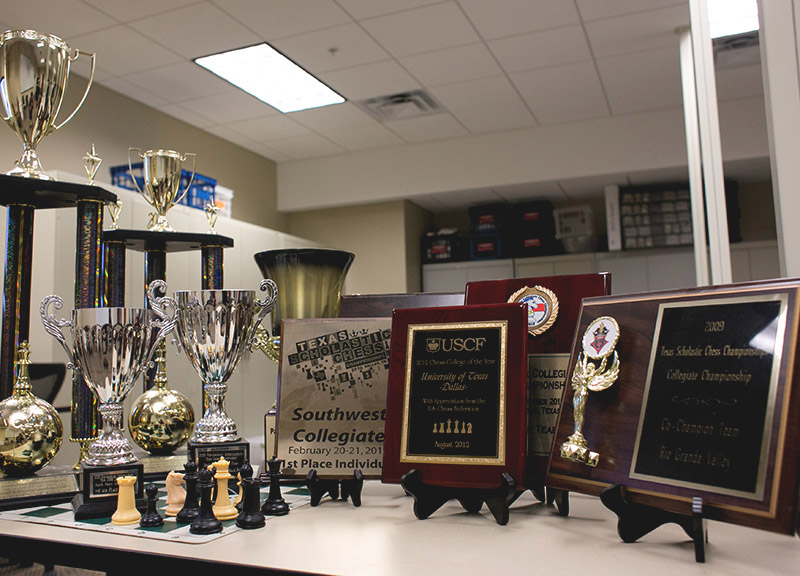
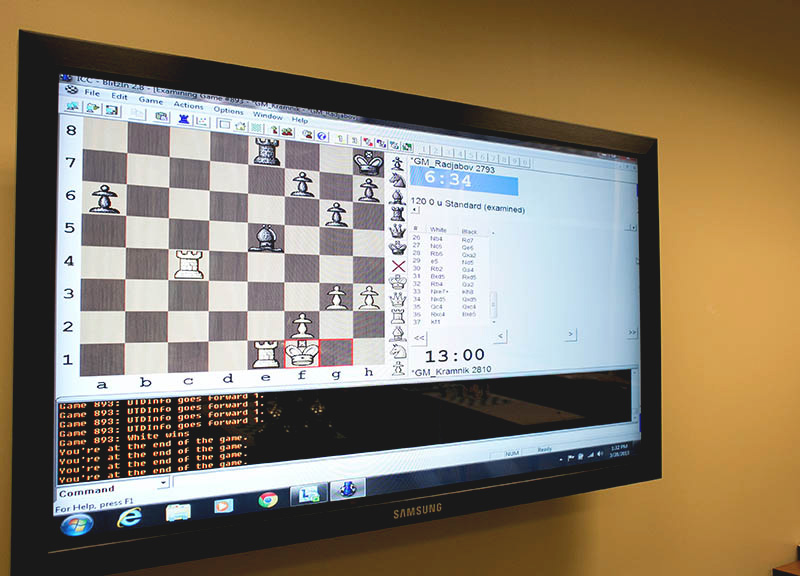
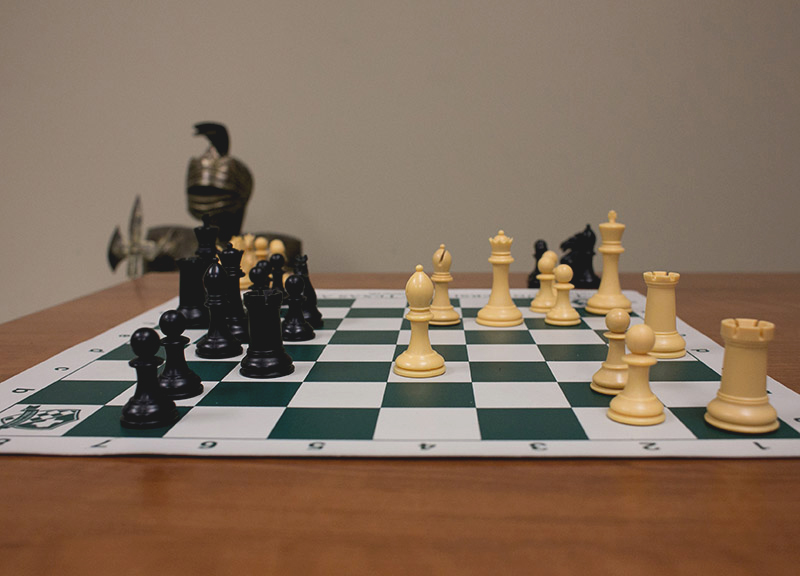
It's Wednesday afternoon, any number of classes are currently in session in various rooms across the University of Texas at Dallas' campus, and, here in the student union, a pep rally is underway.
There's pep aplenty: The university's cheerleading squad performs a couple choreographed routines aimed at raising that Comet Spirit; the school band, led by Dr. Winston Stone, who dons a UTD shirt and a matching green headband to boot, provides the cheerleaders' surprisingly rowdy soundtrack.
There's just not much rally, is all. Several dozen students already eating lunch or shooting pool nearby in the union look on, but mostly out of curiosity. Others grab some slices of the free pizza being offered, but don't pay the greater to-do much mind.
It's a weird scene, this spectacle. There's no doubting that. It's just not something you'd necessarily expect to see here at UTD.
As a member of the NCAA's Division III, UTD doesn't lean much on its athletics department. And yet, somehow, over the course of the past few years, one of the school's teams has quietly become a powerhouse program, a perennial contender for a national championship and a genuine source of pride for the university's administration.
Hence this hoopla, which feels at least a little forced. On a riser behind the dancing cheerleaders and beside the bouncing pep band, the team being celebrated here sits shoulder-to-shoulder, wearing matching blazers bearing their school's logo and, almost uniformly, looking uncertain about how to handle the situation laid out before them.
Some players slouch. Others look half asleep. One or two smile, seemingly as much out of discomfort as anything else.
No, the UTD chess team isn't too accustomed to being fawned over. But university higher-ups don't seem to care much about concerns like these at the moment. Perhaps their pride blinds them: This weekend, the UTD Chess team will travel to Washington D.C. to perform in the President's Cup. The general public -- or, well, those among the general public that are even aware that such a competition even exists -- more commonly refers to it as the Final Four of college chess.
A trip to this tournament is nothing new for UTD. The school's chess team has earned an invitation to compete at this tournament each year since its launch in 2001. It's one of just two schools, along with University of Maryland Baltimore County to earn that distinction. Even more impressive: The school has walked away from the President's Cup with the title a record five times.
Now, after a recent win at the Pan-American Intercollegiate Team Chess Championship in December, the Comets are setting out in hopes of bringing home their sixth national championship. But a win this weekend would also put an end to a slump of sorts for this team; though arguably the most decorated college chess program in the country, UTD hasn't won the President's Cup since 2008.
So, yes, perhaps some urging on like this is in order.
As the pep rally begins to wind down, the cheerleaders and musicians finally take a back seat at the affair and a massive white-and-black sheet replicating a chess board is rolled out onto the floor. Almost immediately, the team looks more at ease. They set plastic game pieces that stand a couple feet high in their appropriate starting positions, and, without much ado, they begin to play.
Here, their talent starts to shine. Here, you can see why these guys are worth some hype. Here, they are fully in their element, showing off without effort why they stand as some of brightest chess minds in the country, if not the world.
"[The chess team] is basically the football team -- or even better -- of the university," says senior business administration student and one of the UTD chess team's four grandmasters, Julio Sadorra. "It creates that intellectual, creative image that the university has."
That intellectual, creative image provides substantial appeal as far as the university is concerned. Few games are considered as high-brow as chess. In turn, there's no debating that a strong chess program is a good look on a university's resume.
And so, in 1996, when a group of students approached a professor at the school, Dr. Tim Redman, about forming a chess club, the school quickly embraced the idea. Only, instead of a club, the school encouraged the students to start a team. It didn't hurt the school's suggestion that Redman boasted some fine chess credentials of his own, having served as a former president of the U.S. Chess Federation.
From that point onward, UTD has fully supported this venture -- and perhaps moreso than any other academic institution before it. To distinguish itself from other universities with chess programs, UTD began offering scholarships and a $10,000 stipend -- an offer that rivals most any offer made by top football college programs to that sport's own top high school talents -- to potential recruits from around the country and the world.
With such an offer in hand, it wasn't long before the UTD program started attracting some of the highest-caliber chess players in the world. Soon, the team was beating competition from such highly regarded institutions as Harvard, MIT and Stanford. And, just like that, chess became a calling card for the university.
These days, the sport is fully woven into the school's identity: A chess plaza featuring four engraved chess boards has even been carved into a main crosswalk along the school's waterway, its central architectural attribute.
Similarly, the school has established itself as a full-on chess education center, one that offers players a variety of educational resources. Classes on both the undergraduate and graduate level are offered. The program even hosts an annual chess education awards ceremony along with other, international conferences.
In September, the U.S. Chess Federation even named UTD its Chess College of the Year.
"This is programmatic," says the program's current director, Jim Stallings. "It's beyond the matter of having a great team, which we do, and competing and winning, which we do. This is all in support of the whole university and its Tier 1 aspirations."
But the chess landscape has changed in recent years. UTD is hardly the only standout. The field has become more competitive.
In Washington, the Comets will face off against a team from Webster University in Missouri that boasts eight grandmasters to their own four. More than just stiff competition, the Webster team serves as an example of the increasingly cutthroat nature of chess on the collegiate level. In 2011 and 2012, Webster head coach Susan Polgar won national championships with her Texas Tech University teams. Then, she singlehandedly shook up the entire chess scene: She resigned from Texas Tech, took the job at Webster -- a school that had previously not had a chess team -- and brought eight of her Texas Tech players with her.
"In terms of basketball-speak, it'd be like Coach Krzyzewski of Duke University going to an unknown private university and dragging his whole team along," Sadorra says.
Polgar's Webster University chess team now enters the Final Four as the top seed, but during the Pan-Am championships in December, which UT Dallas won, the two schools tied 2-2 in their matches. Other perennial contenders, the University of Maryland Baltimore County and the University of Illinois, round out this weekend's competition.
To prepare for this weekend's match-ups, UTD coach Rade Milovanovic and his team has watched film, studied extensive opposing player databases and histories, and installed updates to their own styles of play so as to make their playing strategies that much less predicable.
"I've been thinking about it for two months," Milovanovic says of his own obsessive preparations.
Preparing, meanwhile, is all he can do. Coaches aren't allowed to communicate with their players during their matches; coaches simply set their four-man teams for a particular competition and sit back, hoping they've prepared their squads well enough as they face off against their opponents.
"I've made 14 possible scenarios," Milovanovic says of the task that lays before his team. "I'm trying to prepare myself to find the right four people."
And, with any luck, Sadorra and the lineup of players who will be travelling to D.C. for the Final Four -- graduate student and international master Milos Pavlovic, sophomore grandmaster Valentin Yotov, and junior grandmasters Cristian Chirila and Conrad Holt -- will avenge last year's second-place finish and bring the championship trophy back to what they feel is its rightful home.
"I'm just excited that we're in another Final Four," Sadorra says before his team's university-sanctioned sendoff takes place, sitting comfortably in the team's chess room. "Being in every Final Four, every year, is a testament to this team's competitiveness and dedication. I hope we get it this time. I hope that this extra motivation and extra incentive will push us to perform at a better level."